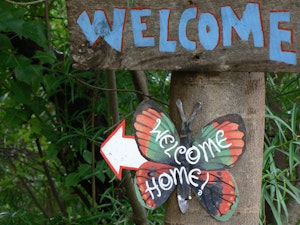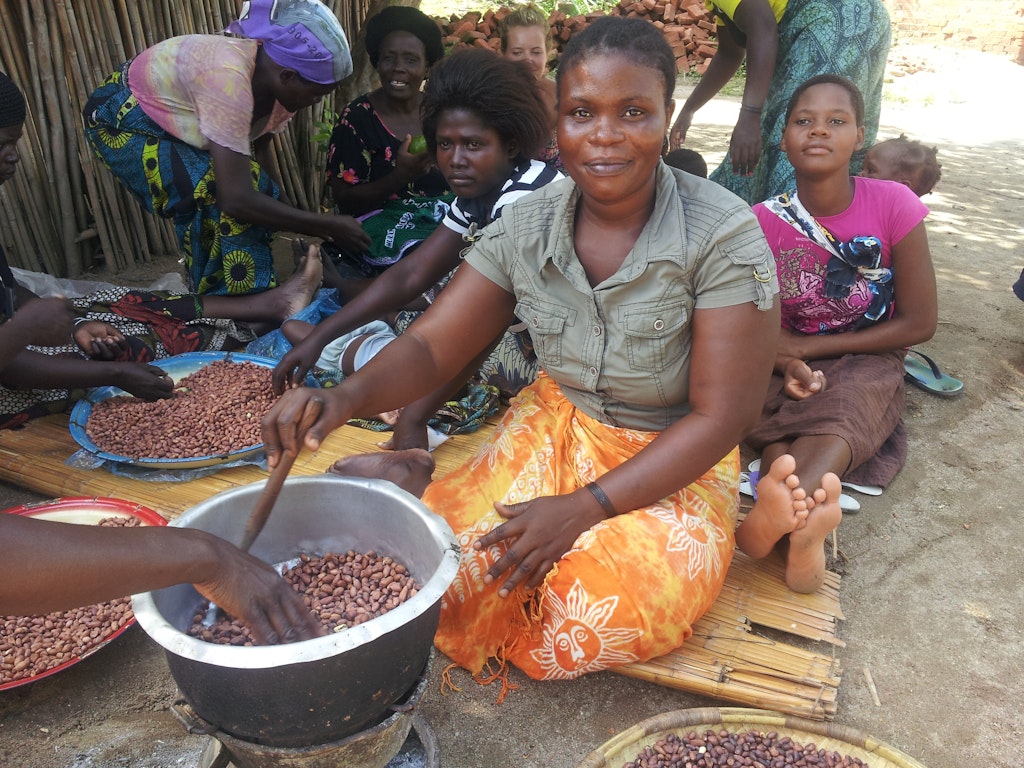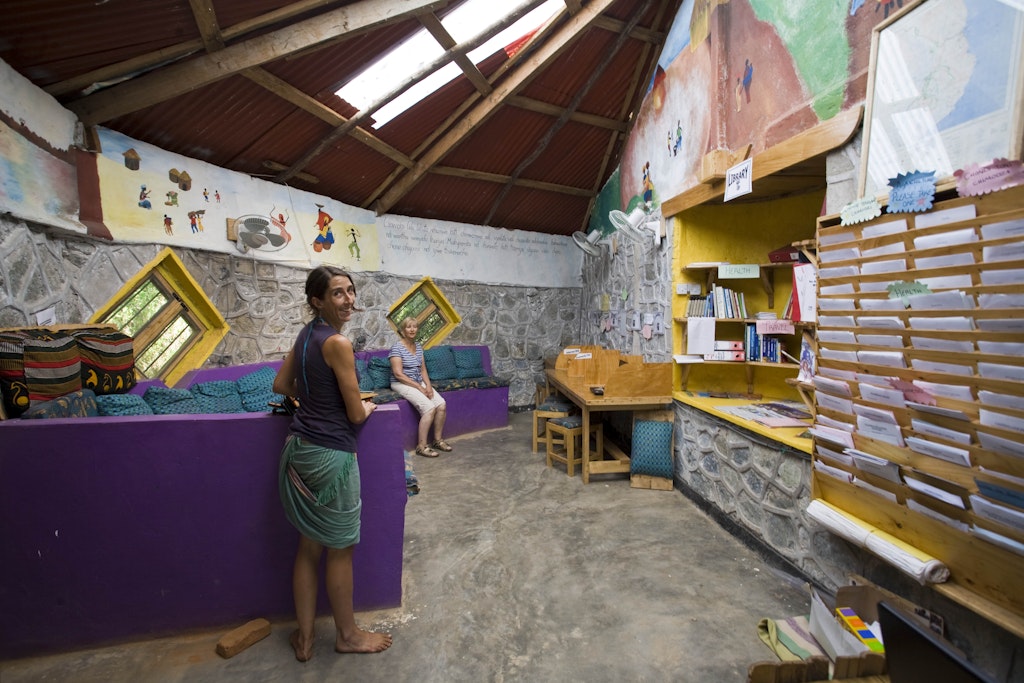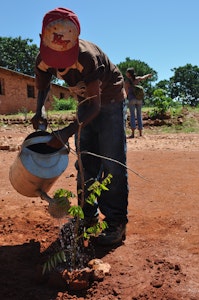Inspired by volunteering at CAT nearly 20 years ago, Josie Redmonds has gone on to set up a wide range of educational community and schools projects in Malawi.
I finished my development studies degree at Swansea in 1997 and was concerned about the mostly theoretical nature of the content. I wanted things to be a bit more hands-on. This led me to CAT in 1999 where I was the biology volunteer, with Louise Halestrap and Peter Harper, and got involved in all  aspects of the water and sanitation areas of the site. It was also the first time I had heard the word permaculture as I helped Roger in the gardens. My time there had a profound effect on me and, more than that, the skills put me in good stead when I set off to Africa in 2001 to volunteer at Lukwe permaculture project in Malawi; I wanted to get involved in something small scale and the things I had learnt at CAT – linked to the environment, information sharing and permaculture – were central to this.
aspects of the water and sanitation areas of the site. It was also the first time I had heard the word permaculture as I helped Roger in the gardens. My time there had a profound effect on me and, more than that, the skills put me in good stead when I set off to Africa in 2001 to volunteer at Lukwe permaculture project in Malawi; I wanted to get involved in something small scale and the things I had learnt at CAT – linked to the environment, information sharing and permaculture – were central to this.
I immediately fell in love with Malawi, a small green mountainous country dominated by the massive lake, known as the ´Warm Heart of Africa´. I instantly felt that Malawi had the potential for sustainability: a fertile and diverse climate, abundant water supply, and a community-based agrarian lifestyle. It was, however, economically poor and government’s influence was limited even with the large number of foreign NGOs in the country. I felt that information and demonstration of alternative technology techniques and permaculture could provide more of the practical skills needed to bring real improvements to people´s everyday lives. The fact that there were already a few permaculture pioneers in Malawi provided the start of a network.

My first few years in Malawi were dominated by numerous small-scale projects on the ground in Nkhata Bay, working with different community groups and developing my links in the community. With books and fact sheets I brought from CAT there was always information available and permaculture training sessions were also held. Working with women´s groups in the area, we initiated some small-scale projects: solar fruit drying, mushroom production and peanut butter production. I also worked on gardens with seven surrounding schools. All this was funded through small donations from interested individuals. This along with funding myself meant that I was back and forward to the UK frequently in these years, which affected the projects immensely. I decided I needed to be living there more full-time if I was to achieve more.
A unique set of circumstances resulted in Alice Leaper and myself buying Butterfly Space in 2007. Our shared vision was to create a community-based lodge focusing on education, environment, community and volunteers. We both had slightly different ideas and over the next few years between us we were involved in and initiated over 15 projects including three nursery schools, a community information and IT room, a youth club, permaculture school gardens, media and music room, work with women´s groups and lately a primary school. Throughout this time we have developed good links with the local government and others in the community as well as with the steady supply of volunteers who have been involved.
One of the first things I started was the community information and IT room. In 2008 a friend Craig Hardie and I cycled the length of the lake (880 km) to fundraise for this project, and a donation of second hand laptops completed the set up. The focus was to be on environment, health and business and the aim was to provide the local community with free access to information. We provide free handouts, access to books and magazines, basic computer lessons, and further research opportunities through a large database. We are also starting to develop a contacts database for community use, and a recent link with the permaculture network of Malawi saw us established as a northern hub of this group. We hope this will increase people’s access to relevant information. The ideal is that people anywhere in Malawi will be able to access useful information that could alter their everyday lives while protecting the environment, an idea not far from where CAT started.

The information room extended into the media and recording room, and recently volunteers have been teaching in areas of music production, radio editing, journalism, blogs, film and photography editing. The fast moving nature of this field means that volunteers always bring a vast amount of new skills with them, in a country where computer access is limited. Working together with the local government and the traditional leaders we are setting up a local community radio station, which has the potential to reach everyone in Nkhata Bay with relevant and educational material.
I also demonstrated techniques around the site at Butterfly, incorporating compost toilets, greywater schemes, solar drying and water heating, and permaculture gardens, again practical skills I had learnt at CAT. These are all explained in the information room, though the scope for new ideas is endless. A recent nature walk around Butterfly, developed for primary school children, highlighted all these techniques.

School gardens have also stayed central to my vision and I continue to work in schools around the district, offering tree planting sessions, educational work linked with UK schools and practical permaculture clubs and training. We had a particularly successful period in 2015-16 with Mkondezi Primary School and, working together with Kate Swatridge, felt we had identified key factors that led to the success and would be followed in order for us to be able to scale up the project.
From this we developed Malawi School Permaculture Project (MSPP), which includes:
- A five-day permaculture training course for two teachers from participating schools;
- A set of 24 lesson plans, eight for each term, with teachers’ aids and practical sessions included;
- Regular teachers’ meetings to discuss and review the lessons;
- Resource packs in order to carry out the lessons, including stationery, tools, seeds and trees;
- Help with a group visit and the school open day at the end of the school year.
It has proved a success. The first open day at Mkondezi Primary School saw over 60 visitors from the community, local government and surrounding schools, from which three more schools signed up to the programme starting in September 2017, meaning that at present we are working with seven schools in the district. Many other schools within Malawi are also interested and we are hoping to make the programme more generally available after feedback received this year.
We hope that by teaching permaculture skills to the next generation and combining that with useful skills from volunteers we can begin to affect change in a society where most solutions have to be found locally as there is little outside assistance.
Ten years into Butterfly, all the projects are going from strength to strength and their potential is snowballing as doors are opened to new opportunities all the time. For volunteers there could never be a better time to get involved as time spent here can make lasting changes in ongoing community projects developed in a sustainable manner. In a country that still has old community networks, bringing relevant local technologies may result in a much more sustainable way of living.
Nothing in Malawi is rushed and, as we approach the environmental changes that seem imminent, the old adage about the hare and the tortoise may come to have real meaning.
